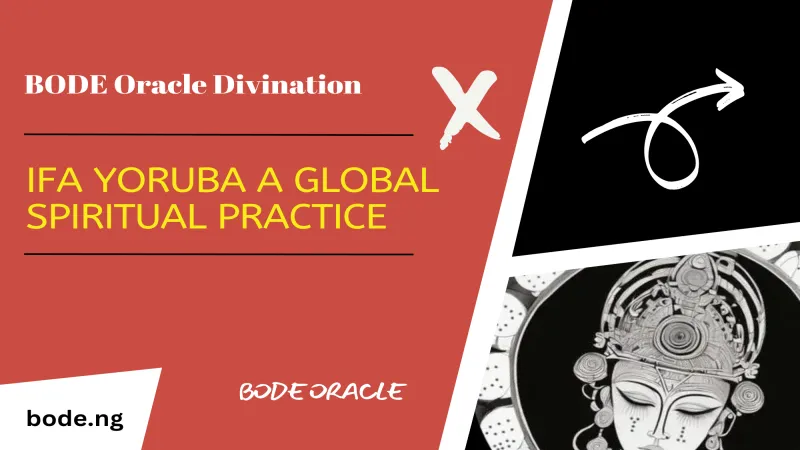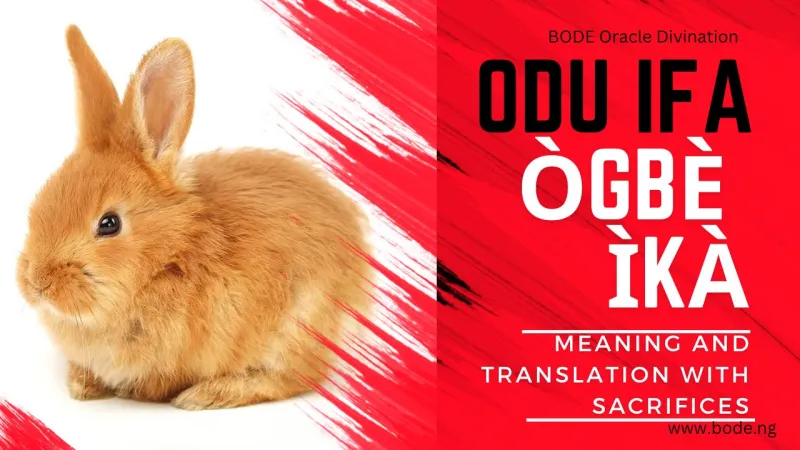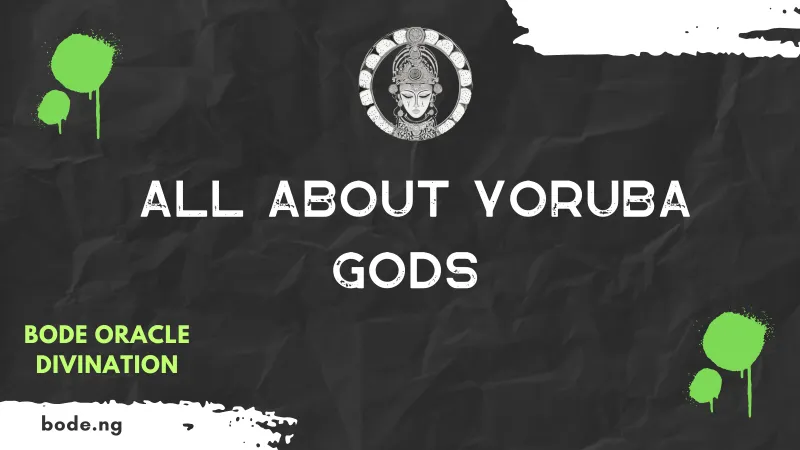Ifá is a divination system that originated in Yorubaland, West Africa. Rooted in the spiritual traditions of the Yoruba people, Ifá is an ancient practice used for guidance, healing, and understanding of the human condition.
Its teachings have influenced other West African belief systems, such as Vodun, and have been integrated into African diasporic religions like Cuban Santería, creating a unique bridge between Africa and the Americas.
Ifá centers around divinatory wisdom overseen by Orunmila, an orisha (spirit) who, according to Yoruba tradition, bestowed this system upon humanity.
The Ifá tradition is organized as an initiatory system, where priests and priestesses known as Babaláwo and Iyaláwo are trained in the complex practice of interpreting the divine messages within Ifá’s sacred texts.
You Can Also Read More On
Brief History of Hermeneutics in Relation to Odu Ifa
The Structure of Ifá's Divinatory System
The Ifá divination system is composed of an oral literary corpus, divided into 256 Odu or signs, which guide the practitioner in providing solutions to various human issues.
The Odu is structured into two main categories: Ojú Odù (the primary 16 signs) and Amúlù Odù (the additional 240 signs derived from combinations of the main 16).
Practitioners use either the Ọ̀pẹ̀lẹ̀ chain or sacred palm or kola nuts (Ikin) on a divination tray (Ọpọ́n Ifá) to determine which Odu applies in each reading, following a mathematical process deeply rooted in Yoruba cosmology.
West African Origins of Ifá
The origins of Ifá are deeply tied to Yoruba history, particularly in Ilé-Ifẹ, which Yoruba mythology regards as the cradle of human civilization.
According to tradition, Orunmila first initiated himself and later taught Akoda and Aseda, his earliest disciples. The Yoruba historian Samuel Johnson credits Arugba, the mother of the 8th Alaafin of Oyo, with introducing Ifá to the Oyo Empire in the late 15th century.
This introduction led to Ifá’s spread throughout the Yoruba Empire, with Oyo priests initiating new practitioners and embedding Ifá into the cultural practice of the kingdom.
During the 18th and early 19th centuries, the neighboring Fon people of Dahomey (now Benin) adopted Ifá practices as their kingdom interacted with the Oyo Empire.
This period of exchange incorporated Ifá, alongside Yoruba cults like Egungun and Oro, into the religious framework of Dahomey. By the mid-19th century, Ifá held a prominent position within the Dahomey royal palace, symbolizing the interconnected spiritual and political ties between these West African kingdoms.
How Ifa Practice Has Influenced West Africa
Ifá's significance has continued to evolve, particularly in modern Nigeria and Benin, where it remains practiced by traditional followers.
The Ifá tradition spread from Yorubaland to neighboring regions due to Yoruba political and cultural influence.
For instance, the Yoruba-dominated Oyo Empire had a significant influence over the kingdom of Dahomey (modern-day Benin), resulting in the adoption of Ifá among the Fon people.
This integration led to shared practices and mutual cultural exchanges, including divination and reverence for certain orishas (deities).
People Also Read
Opon Ifa The Ifa Divination Tray
Ifa Divination And How It Can Solve Your Problems
Yoruba Mythology Deities And Orisa
Ifá Yoruba in Cuba
Through the transatlantic slave trade, Yoruba religious practices, including Ifá, were transplanted to the Americas, particularly in Cuba.
There, Ifá integrated with other African traditions, influencing and being influenced by Afro-Cuban religions such as Santería.
Ifá remains the most respected divinatory system within Santería, and although distinct from Santería in some respects, the two share fundamental beliefs and cosmologies.
In Santería, Orunmila, known as Orula, plays a central role, and Cuban babalawos often participate in ceremonies as advisors and diviners.
The Cuban Revolution and subsequent economic shifts led to government support of Afro-Cuban traditions, including Ifá, as symbols of cultural identity and potential tourism attractions.
In the 1980s, Cuban babalawos organized an institution called Ifá Yesterday, Ifá Today, Ifá Tomorrow, the first of its kind to represent Ifá as a formal religious organization in Cuba.
Today, Cuban babalawos play a significant role in preserving and promoting Ifá, with some even leading government-sponsored tours for those seeking to learn about and initiate into the practice.
How Ifa Practice Has Influenced Cuba
The most prominent Afro-diasporic religion influenced by Ifá is Santería in Cuba. The enslaved Yoruba brought Ifá to Cuba, where it merged with elements of Catholicism and other African religious practices to form Santería.
In Santería, Ifá became the most respected divination system, with Orula (Orunmila) revered as a central figure.
While Santería retains a distinct identity, the Ifá divinatory practice remains integral to the religion, and babalawos often participate in Santería rituals, reinforcing a cultural connection between Cuban and Yoruba traditions.
Ifá Yoruba in the United States
Cuban migrants brought Ifá to the United States, where it flourished, particularly in New York and Miami. The 1960s saw a notable increase in the presence of babalawos in the U.S., who were instrumental in creating santería houses, where both Ifá and Santería practices were observed.
This period marked the beginning of two types of Ifá communities in the U.S.; those that maintained traditional connections with babalawos and those that developed independently.
During the late 1970s, Nigerian babalawos began traveling to the U.S. to provide formal Ifá training and initiations.
Ifayẹmi Elébùìbn, a Nigerian babalawo, performed significant ceremonies in Miami, establishing a bridge between African and Cuban-American practitioners.
In the 1980s, the Ifá Foundation of North and Latin America emerged, offering an alternative approach to Ifá with “bloodless” initiations, thereby appealing to Western adherents who preferred a non-sacrificial practice.
How Ifa Practice Has Influenced United States
Cuban immigrants brought Ifá to the United States, especially in New York and Miami. In New York, distinct Santería communities formed that either relied on babalawos or adapted to operate independently.
Miami became another hub for Ifá practices, and collaboration between Nigerian and Cuban babalawos helped introduce traditional Ifá ceremonies in the U.S.
As interest in African spirituality grew, organizations such as the Ifa Foundation of North and Latin America emerged, offering modified initiation practices to appeal to diverse groups, including those uncomfortable with traditional practices like animal sacrifice.
Read More
Iwe Odu Ifa by Ifayemi Awopeju Bogunmbe
Odu Ifa Signs And How They Are Cast
Ifá Yoruba in Brazil
In Brazil, Ifá’s influence endures through the religion of Candomblé, which draws heavily from Yoruba traditions but primarily uses diloggun (a simpler form of divination) rather than Ifá’s full system.
However, the late 20th century saw renewed interest in Ifá, led by influential figures such as Pierre Verger, a French ethnographer initiated into Ifá in West Africa who bridged Candomblé practices with Ifá.
In the 1970s, Brazil experienced a Yoruba cultural renaissance, sparking formal efforts to teach Ifá. In 1977, the Yoruba Culture Research and Study Centre was founded to educate Brazilians on Yoruba philosophy and religion, including Ifá divination.
The center attracted a following of omo Ifá (children of Ifá), who later became advocates and practitioners, helping to integrate Ifá into Brazilian culture.
Today, Brazil hosts a growing number of Ifá devotees and babalawos, continuing a cultural exchange that strengthens ties between the African diaspora in Brazil and Yoruba communities in West Africa.
How Ifa Practice Has Influenced Brazil
In Brazil, Ifá influenced Candomblé, another Afro-Brazilian religion deeply rooted in Yoruba traditions. Although Candomblé typically uses a different divinatory method, the diloggun, Ifá's spiritual teachings have informed many of its practices.
In the 1970s, growing connections between Brazil and Nigeria sparked renewed interest in traditional Yoruba culture and divination.
Organizations like the Yoruba Culture Research and Study Centre were established in Brazil, and Brazilian practitioners began studying under Nigerian babalawos. This has led to a broader integration of Yoruba divination knowledge in Brazil.



